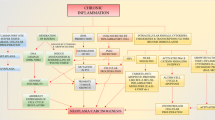Summary
Genetic instability is a hallmark of human cancers. It is the driving force for tumor development as it facilitates the accumulation of mutations in genes that regulate cell death and proliferation and therefore promotes malignant transformation. Chronic inflammation is a common underlying condition for human tumor development, accounting for approximately 20% of human cancers. TNFα is an important inflammation cytokine and is crucial to the development of inflammation-associated cancers. We have shown that TNFα can cause DNA damages through reactive oxygen species (ROS). TNFα treatment in cultured cells resulted in increased gene mutations, gene amplification, micronuclei formation and chromosomal instability. Antioxidants significantly reduced TNFα-induced genetic damage. In addition, TNFα treatment alone led to increased malignant transformation of mouse embryo fibroblasts, which could be partially suppressed by antioxidants. Therefore, genetic instability plays an important role in inflammation-associated cancers.
Access this chapter
Tax calculation will be finalised at checkout
Purchases are for personal use only
Similar content being viewed by others
References
Yan, B., Wang, H., Rabbani, Z.N., Zhao, Y., Li, W., Yuan, Y., Li, F., Dewhirst, M.W., and Li, C.Y. (2006) Tumor necrosis factor- alpha is a potent endogenous mutagen that promotes cellular transformation. Cancer Res 66, 11565–11570.
Yan, B., Wang, H., Peng, Y., et al. (2006) A unique role of the DNA fragmentation factor in maintaining genomic stability. Proc Natl Acad Sci U S A 103, 1504–1509.
Yin, Y., Tainsky, M.A., Bischoff, F.Z., Strong, L.C., and Wahl, G.M. (1992) Wild-type p53 restores cell cycle control and inhibits gene amplification in cells with mutant p53 alleles. Cell 70, 937–948.
Livingstone, L.R., White, A., Sprouse, J., Livanos, E., Jacks, T., and Tlsty, T.D. (1992) Altered cell cycle arrest and gene amplification potential accompany loss of wild-type p53. Cell 70, 923–935.
Chen, S., Bigner, S.H., and Modrich, P. (2001) High rate of CAD gene amplification in human cells deficient in MLH1 or MSH6. Proc Natl Acad Sci U S A 98, 13802–13807.
Davisson, M.T. (2003) Mitotic Chromosome Preparations from Bone Marrow. The Jackson Laboratory Website (http://www.jax.org/cyto/marrow_preps_alt.html).
Lichter, P. , Ledbetter, S.A., Ledbetter, D.H., and Ward, D.C. (1990) Fluorescence in situ hybridization with Alu and L1 polymerase chain reaction probes for rapid characterization of human chromosomes in hybrid cell lines. Proc Natl Acad Sci U S A 87, 6634–6638.
Yan, B., Wang, H., Wang, H., et al. (2006) Apoptotic DNA fragmentation factor maintains chromosome stability in a P53-independent manner. Oncogene 25, 5370–5376.
Fenech, M. (2000) The in vitro micronucleus technique. Mutat Res 455, 81–95.
de Souza-Pinto, N.C., Eide, L., Hogue, B.A., Thybo, T., Stevnsner, T., Seeberg, E., Klun-gland, A., and Bohr, V.A. (2001) Repair of 8-oxodeoxyguanosine lesions in mitochon-drial DNA depends on the oxoguanine DNA glycosylase (OGG1) gene and 8-oxoguanine accumulates in the mitochondrial DNA of OGG1-defective mice. Cancer Res 61, 5378–5381.
Cox, A.D., and Der, C.J.D. (1994) Biological assays for cellular transformation. Methods Enzymol 238, 277–294.
Author information
Authors and Affiliations
Editor information
Editors and Affiliations
Rights and permissions
Copyright information
© 2009 Springer Science+Business Media, LLC
About this protocol
Cite this protocol
Yan, B., Peng, Y., Li, CY. (2009). Molecular Analysis of Genetic Instability Caused by Chronic Inflammation. In: Kozlov, S.V. (eds) Inflammation and Cancer. Methods in Molecular Biology™, vol 512. Humana Press. https://doi.org/10.1007/978-1-60327-530-9_2
Download citation
DOI: https://doi.org/10.1007/978-1-60327-530-9_2
Publisher Name: Humana Press
Print ISBN: 978-1-60327-529-3
Online ISBN: 978-1-60327-530-9
eBook Packages: Springer Protocols




